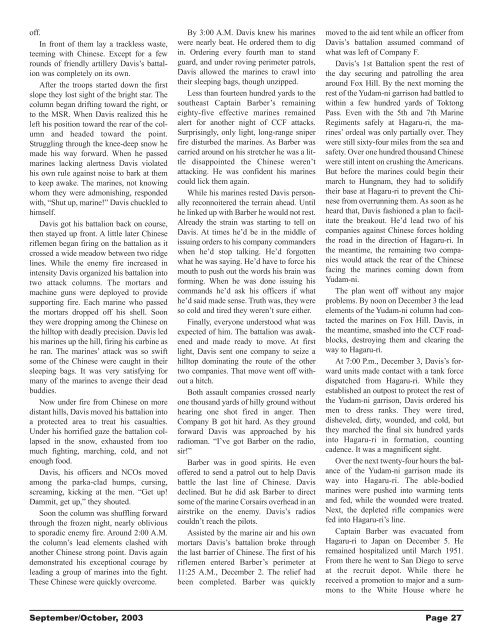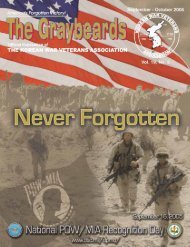GENERAL RAYMOND G. DAVIS - Korean War Veterans Association
GENERAL RAYMOND G. DAVIS - Korean War Veterans Association
GENERAL RAYMOND G. DAVIS - Korean War Veterans Association
Create successful ePaper yourself
Turn your PDF publications into a flip-book with our unique Google optimized e-Paper software.
off.<br />
In front of them lay a trackless waste,<br />
teeming with Chinese. Except for a few<br />
rounds of friendly artillery Davis’s battalion<br />
was completely on its own.<br />
After the troops started down the first<br />
slope they lost sight of the bright star. The<br />
column began drifting toward the right, or<br />
to the MSR. When Davis realized this he<br />
left his position toward the rear of the column<br />
and headed toward the point.<br />
Struggling through the knee-deep snow he<br />
made his way forward. When he passed<br />
marines lacking alertness Davis violated<br />
his own rule against noise to bark at them<br />
to keep awake. The marines, not knowing<br />
whom they were admonishing, responded<br />
with, “Shut up, marine!” Davis chuckled to<br />
himself.<br />
Davis got his battalion back on course,<br />
then stayed up front. A little later Chinese<br />
riflemen began firing on the battalion as it<br />
crossed a wide meadow between two ridge<br />
lines. While the enemy fire increased in<br />
intensity Davis organized his battalion into<br />
two attack columns. The mortars and<br />
machine guns were deployed to provide<br />
supporting fire. Each marine who passed<br />
the mortars dropped off his shell. Soon<br />
they were dropping among the Chinese on<br />
the hilltop with deadly precision. Davis led<br />
his marines up the hill, firing his carbine as<br />
he ran. The marines’ attack was so swift<br />
some of the Chinese were caught in their<br />
sleeping bags. It was very satisfying for<br />
many of the marines to avenge their dead<br />
buddies.<br />
Now under fire from Chinese on more<br />
distant hills, Davis moved his battalion into<br />
a protected area to treat his casualties.<br />
Under his horrified gaze the battalion collapsed<br />
in the snow, exhausted from too<br />
much fighting, marching, cold, and not<br />
enough food.<br />
Davis, his officers and NCOs moved<br />
among the parka-clad humps, cursing,<br />
screaming, kicking at the men. “Get up!<br />
Dammit, get up,” they shouted.<br />
Soon the column was shuffling forward<br />
through the frozen night, nearly oblivious<br />
to sporadic enemy fire. Around 2:00 A.M.<br />
the column’s lead elements clashed with<br />
another Chinese strong point. Davis again<br />
demonstrated his exceptional courage by<br />
leading a group of marines into the fight.<br />
These Chinese were quickly overcome.<br />
By 3:00 A.M. Davis knew his marines<br />
were nearly beat. He ordered them to dig<br />
in. Ordering every fourth man to stand<br />
guard, and under roving perimeter patrols,<br />
Davis allowed the marines to crawl into<br />
their sleeping bags, though unzipped.<br />
Less than fourteen hundred yards to the<br />
southeast Captain Barber’s remaining<br />
eighty-five effective marines remained<br />
alert for another night of CCF attacks.<br />
Surprisingly, only light, long-range sniper<br />
fire disturbed the marines. As Barber was<br />
carried around on his stretcher he was a little<br />
disappointed the Chinese weren’t<br />
attacking. He was confident his marines<br />
could lick them again.<br />
While his marines rested Davis personally<br />
reconnoitered the terrain ahead. Until<br />
he linked up with Barber he would not rest.<br />
Already the strain was starting to tell on<br />
Davis. At times he’d be in the middle of<br />
issuing orders to his company commanders<br />
when he’d stop talking. He’d forgotten<br />
what he was saying. He’d have to force his<br />
mouth to push out the words his brain was<br />
forming. When he was done issuing his<br />
commands he’d ask his officers if what<br />
he’d said made sense. Truth was, they were<br />
so cold and tired they weren’t sure either.<br />
Finally, everyone understood what was<br />
expected of him. The battalion was awakened<br />
and made ready to move. At first<br />
light, Davis sent one company to seize a<br />
hilltop dominating the route of the other<br />
two companies. That move went off without<br />
a hitch.<br />
Both assault companies crossed nearly<br />
one thousand yards of hilly ground without<br />
hearing one shot fired in anger. Then<br />
Company B got hit hard. As they ground<br />
forward Davis was approached by his<br />
radioman. “I’ve got Barber on the radio,<br />
sir!”<br />
Barber was in good spirits. He even<br />
offered to send a patrol out to help Davis<br />
battle the last line of Chinese. Davis<br />
declined. But he did ask Barber to direct<br />
some of the marine Corsairs overhead in an<br />
airstrike on the enemy. Davis’s radios<br />
couldn’t reach the pilots.<br />
Assisted by the marine air and his own<br />
mortars Davis’s battalion broke through<br />
the last barrier of Chinese. The first of his<br />
riflemen entered Barber’s perimeter at<br />
11:25 A.M., December 2. The relief had<br />
been completed. Barber was quickly<br />
moved to the aid tent while an officer from<br />
Davis’s battalion assumed command of<br />
what was left of Company F.<br />
Davis’s 1st Battalion spent the rest of<br />
the day securing and patrolling the area<br />
around Fox Hill. By the next morning the<br />
rest of the Yudam-ni garrison had battled to<br />
within a few hundred yards of Toktong<br />
Pass. Even with the 5th and 7th Marine<br />
Regiments safely at Hagaru-ri, the marines’<br />
ordeal was only partially over. They<br />
were still sixty-four miles from the sea and<br />
safety. Over one hundred thousand Chinese<br />
were still intent on crushing the Americans.<br />
But before the marines could begin their<br />
march to Hungnam, they had to solidify<br />
their base at Hagaru-ri to prevent the Chinese<br />
from overrunning them. As soon as he<br />
heard that, Davis fashioned a plan to facilitate<br />
the breakout. He’d lead two of his<br />
companies against Chinese forces holding<br />
the road in the direction of Hagaru-ri. In<br />
the meantime, the remaining two companies<br />
would attack the rear of the Chinese<br />
facing the marines coming down from<br />
Yudam-ni.<br />
The plan went off without any major<br />
problems. By noon on December 3 the lead<br />
elements of the Yudam-ni column had contacted<br />
the marines on Fox Hill. Davis, in<br />
the meantime, smashed into the CCF roadblocks,<br />
destroying them and clearing the<br />
way to Hagaru-ri.<br />
At 7:00 P.m., December 3, Davis’s forward<br />
units made contact with a tank force<br />
dispatched from Hagaru-ri. While they<br />
established an outpost to protect the rest of<br />
the Yudam-ni garrison, Davis ordered his<br />
men to dress ranks. They were tired,<br />
disheveled, dirty, wounded, and cold, but<br />
they marched the final six hundred yards<br />
into Hagaru-ri in formation, counting<br />
cadence. It was a magnificent sight.<br />
Over the next twenty-four hours the balance<br />
of the Yudam-ni garrison made its<br />
way into Hagaru-ri. The able-bodied<br />
marines were pushed into warming tents<br />
and fed, while the wounded were treated.<br />
Next, the depleted rifle companies were<br />
fed into Hagaru-ri’s line.<br />
Captain Barber was evacuated from<br />
Hagaru-ri to Japan on December 5. He<br />
remained hospitalized until March 1951.<br />
From there he went to San Diego to serve<br />
at the recruit depot. While there he<br />
received a promotion to major and a summons<br />
to the White House where he<br />
September/October, 2003 Page 27

















